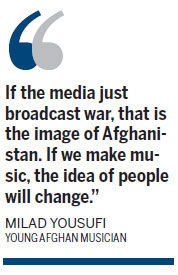
Some of them call an orphanage home. One used to spend her days selling plastic bags. And this month, the Afghan teenagers are taking the stage of the most prestigious United States concert halls.
In a vivid sign of Afghanistan's transformation, 48 students from the country's first music institute are touring the US to showcase a unique blend of restored traditional music and Western classics.
When Milad Yousufi was a child, the Taliban ruled most of Afghanistan and imposed an austere interpretation of Islam that banned music as sinful. He took up piano five years ago and recently placed third at an international competition in Germany.
"Music is the only thing we can bring peace by," said the 18-year-old, who wears his hair fashionably long and counts Claudio Arrau and Vladimir Horowitz among his piano heroes.

"If the media just broadcast war, that is the image of Afghanistan. If we make music, the idea of people will change," he said in fluent English.
The Afghanistan National Institute of Music, which was founded in 2010, has 144 students. Each of the students earned their places through auditions.
They study not only music but also English and other courses, including the Quran and computers.
The students will perform at the Kennedy Center in Washington on Thursday. On Feb 12, they will be at New York's Carnegie Hall.
One musical selection will be a version of Antonio Vivaldi's The Four Seasons, adapted by instructor William Harvey with Afghan instrumentation.
"Your expectations are the traditional Vivaldi. But, here, you hear in The Four Seasons Afghan pieces and Afghan melodies," said Ahmad Sarmast, the founder and director of the school.
"That's the way we say to the international community that we are part of you, we want to be part of you. We can speak the same language, the language of music," he said.
The students, with boys and girls intermingled, started their tour with a recital at the State Department, where they sat on the floor performing with Afghan instruments such as the rubab: a lute with up to 19 strings.
In a surprise appearance, US Secretary of State John Kerry took a seat to listen on his first day on the job. During Kerry's tenure, the US is expected to withdraw the last of its combat troops from Afghanistan in 2014.
Calling music "the international language of peace and of possibilities and dreams," the former senator said that he had "very, very high hopes for your country that you can find peace and stability."
The 69-year-old mentioned that when he was the students' age, he played in a rock band called the Electras, whose performances can be found on YouTube.
"And I still play guitar. When I go home, I love to play guitar," Kerry said, which prompted several Afghan teenagers, who had been listening expressionless, to roar with approval and wave him the heavy-metal-style sign of the horns.
Sarmast, who has a doctorate in music from Monash University in Australia, said that the attitudes of young Afghans made him confident about the future, even though he relies largely on funding from the US and other governments to run the school.
He pointed to protests last year in the western city of Herat, where young people took to the streets to overrule a cleric who tried to ban a concert.
"The mentality of the youth has enormously changed," Sarmast said. "The condition is not the same which led to the arrival of the Taliban."
His institute is working on the first notation to preserve Afghan traditional music, which has been passed down orally.
Derek Beckvold, 26, a US citizen who teaches saxophone at the institute, said he was trying to broaden the musical exposure of his students beyond Afghan and Western classics.
Beckvold said the young Afghans enjoyed discovering Nigerian Afrobeat superstar Fela Kuti, along with popular music from Morocco and 1970s Ethiopia.
Beckvold, a graduate of the New England Conservatory of Music in Boston, where the students will also play, said that jazz was generally a harder sell. But there are still surprises.
"I play them a couple of tracks and the next day one of the kids comes in with a flash drive and says, 'Teacher, can I have every Charlie Parker album that you own?' Which is a lot," said Beckvold, referring to the jazz legend.
In the US, "a lot of people maybe don't value the importance of education so much because it's readily available," he said. "In Afghanistan, not everybody gets a decent education, so everybody seems very hungry to learn."
Shaheer Kabuli, 20, who studies trumpet, voiced hope that the tour "will show every country that Afghanistan has music" as the country prepares for its transition.
"In 2014, if the Taliban will not come back in Afghanistan, I think that music will do very well," he said. "But if they come back like they did 10 years ago, then ..." His voice trailed off.